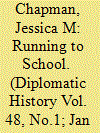|
|
|
Sort Order |
|
|
|
Items / Page
|
|
|
|
|
|
|
| Srl | Item |
| 1 |
ID:
193509


|
|
|
|
|
| Summary/Abstract |
It is no overstatement to say that access to formerly classified material produced by and for the highest levels of the U.S. government has been and will remain fundamental to our field, even as scholars continue to push the field in new and exciting directions that move well beyond the confines of official government actors.1 The program for the 2023 Society for Historians of American Foreign Relations Conference provides ample evidence of the importance the Society places on access to previously classified materials.2 Many of the papers presented and books discussed over the conference’s three days made use of previously classified materials, as did much of the recent scholarship announced in publishers’ advertisements and arrayed at their display tables. The conference’s plenary session highlighted past and ongoing efforts to ensure access, and issues surrounding records access were the subject of Director of the National Security Archive Tom Blanton’s talk at the Saturday luncheon. Tom and his team have spearheaded all manner of efforts on behalf of records access.3 Our collective debt to them is enormous.
|
|
|
|
|
|
|
|
|
|
|
|
|
|
|
|
| 2 |
ID:
193511


|
|
|
|
|
| Summary/Abstract |
“This is a state school run by the local oligarchy and influenced by the North American financial monopolies,” Colombian student Carlos Jiménez Moreno told the Washington Post in 1971.1 Jiménez, a twenty-three-year-old architecture student at University of Valle in Cali, Colombia, gave the interview as leader of an eight-person strike committee. He was right about the university: it was beset with local, national, and international funding that rendered it both a showcase of development for funders and a target of protest for students. “U.S. Ties Trouble ‘Gringo U.’,” the Washington Post headline read. Students who went on strike at University of Valle in early 1971 objected to funding by local and international elites and, in the process, levied important critiques of local and global wealth inequality, imperialism, and the enterprise of international development.
|
|
|
|
|
|
|
|
|
|
|
|
|
|
|
|
| 3 |
ID:
193510


|
|
|
|
|
| Summary/Abstract |
In the early 1970s, following a brilliant showing by the Kenyan men’s track and field team at the 1968 Olympic Games in Mexico City, a handful of the nation’s young stars accepted athletic scholarships to U.S. colleges. They served as harbingers of much more robust recruiting pipelines that would soon bring dozens—and later hundreds—of Kenyan student athletes to U.S. institutions of higher education. These pipelines were established just prior to Kenya’s back-to-back boycotts of the 1976 and 1980 Olympic Games which, combined with crippling economic stagnation at home, stunted investment in the newly independent nation’s burgeoning athletics program. During this lull, access to elite training and competition in the U.S. collegiate system proved critical to sustaining the trajectory of Kenyan middle- and long-distance running, which has since become one of the most striking examples of national dominance in any sport. Perhaps even more significantly, these pipelines offered student athletes—mostly poor, ethnic-minority Kalenjin from the Rift Valley—otherwise unheard-of access to higher education abroad.
|
|
|
|
|
|
|
|
|
|
|
|
|
|
|
|
| 4 |
ID:
193512


|
|
|
|
|
| Summary/Abstract |
On November 24, 1964, University of California Chancellor Vernon Cheadle addressed the audience at his institution’s newly opened Education Abroad Program (EAP) study center at the University of Madrid. After thanking the Spanish faculty who had aided EAP in securing a relationship with their university, Cheadle turned his attention to the California students spending the year in Spain. “I want to congratulate the students on the determination to have an intellectually exciting, revealing, provocative, and permanently decisive experience,” he began. “You will not always be fully satisfied, but I am convinced of your resourcefulness and independence of spirit. You will not easily forget your time here and I hope for you all the best.”1 The limits to satisfaction Cheadle anticipated directly correlated to the fact that as guests in fascist Spain, University of California (UC) students were expected to relinquish certain liberties afforded to them as citizens in the United States—most notably the freedoms of political speech and protest. It was, in fact, these specific sacrifices that EAP officials deemed crucial to the success of the Spain program and to students’ educational experience.2 By gaining insight into life under an oppressive regime, EAP students were expected to develop a deeper appreciation for the American way of life and to garner support within their host country for the United States’ global stewardship in ensuring a world safe for democracy.
|
|
|
|
|
|
|
|
|
|
|
|
|
|
|
|
| 5 |
ID:
193513


|
|
|
|
|
| Summary/Abstract |
Washington’s covert intervention to help overthrow the leftist but democratic government of Guatemala in 1954 had tragic consequences that still resonate strongly today. Guatemala’s military coup produced a long series of repressive regimes responsible for the deaths of several hundred thousand people and other deep social traumas that have yet to heal. The apparent success of the coup also prompted subsequent U.S. leaders to rely on similar tactics around the world, all too often with regrettable results. Not surprisingly, the remarkable story of this intervention has been the subject of intense scholarly study.
|
|
|
|
|
|
|
|
|
|
|
|
|
|
|
|
|
|
|
|
|